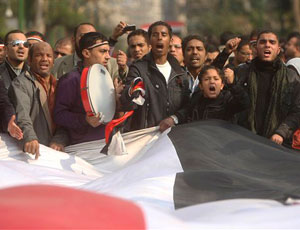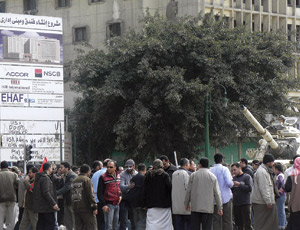Some normalcy was returning to Egypt after three weeks of protests against President Hosni Mubarak’s government. But the social and political turmoil continued to take a toll on many construction projects as expatriates fled the country and work progress slowed or ground to a halt. While many Egyptian industry professionals support the protests, some observers wonder what the long-term impact will be on the country’s economy and construction market.


“This year had been excellent so far,” says Mohamed Fahmy, vice president of EHAF Consulting Engineers, Giza, Egypt. “The Egyptian construction sector was recovering faster than expected, and our turnover was doubling. [But in the protest’s wake] a tsunami of deep recession looms on the horizon until investors get confidence back in the government.”
Global firms working in Egypt reached by ENR report some disruption in projects, particularly in Cairo. Spokesmen for France-based contractors Vinci and Bouygues, which are working on Cairo Metro’s $3-billion transit line No. 3, say the jobsite and their local offices remain closed. The firms also evacuated to Paris 180 expatriates and family members.
A spokeswoman for French design firm Systra says it has “cancelled planned missions to Egypt,” although the Cairo office of Montreal-based SNC Lavalin is open “on a partial basis every day,” says Vice President Leslie Quinton. Local staff are “working from home until the transportation situation is back to normal.”
Paris-based Setec Consultants says a hospital project in Egypt is on hold and adds that an employee was injured in the protests. “Egyptian staff have been instructed to stay at home, and our office is closed,” says Pierre Lescaut, the firm’s secretary general. “It’s too early to say” if the unrest will affect future work, but he says “delays are expected.”
Wim Klomp, director of ports and waterways for Netherlands-based engineer DHV, says he has been unable to make contact with Egyptian partners on a planned tunnel project under the Suez Canal and has returned home.
One project particularly caught up in the protests is a Novotel hotel project—in Cairo’s Tahrir Square, the key protest location—which is being managed by a joint venture of Hill International, Marlton, N.J., and EHAF. Fahmy says army tanks were positioned outside the shut-down site to prevent damage or theft.
Fahmy also notes disruption on another EHAF-Hill project, the estimated $800-million Grand Egyptian Museum in Giza, set to be the country’s largest museum when completed in 2013. Under Feb. 1 evacuation orders from the U.S. State Dept., 16 Hill managers were sent home, he says. “This was painful, particularly since this team was ready to study contractor bids,” he says. Fahmy says EHAF has reassigned staff to other Middle East locations.
The Army Corps of Engineers’ Middle East District “is at work stoppage in Egypt, with mandated staff evacuation,” says Kendal Smith, a district spokesman in Winchester, Va. “We will return when the State Dept. gives the go-ahead.” But, as of Feb. 6, the district’s foreign national employees “are back to work within Egyptian governmental curfew restrictions,” he says. Among other things, the Corps is involved in the Pacer Forge program to upgrade facilities at 35 Egyptian military installations. The effort’s $100-million fourth phase is set to begin in October.
Egyptian and foreign firm executives are hopeful the previously booming market will resume. The government last year promised to spend $17 billion on infrastructure. Cairo-based Orascom Construction Industries said on Feb. 7 that work at 90% of its sites had resumed. The firm said in January it would bid on the Al Dabaa nuclear powerplant, Egypt’s first.
Egyptian architectural engineer Sherhihan Salama is fielding some offers from a Facebook-posted request to local architects, civil engineers, project managers and designers for pro bono services to redesign and repair damaged buildings in Cairo and Alexandria.
“The transition from a heavy autocratic government to a more democratic form will require time and patience,” says Richard Fox, CEO of CDM, the Cambridge, Mass., engineering firm now finalizing sewer system upgrades there. “This may have a chilling effect on development and business for an extended period.” Sherin Mosbeh, deputy general manager of power-sector engineer PGESCo, Cairo, adds, “It will depend on measures taken now for changes to democracy and the degree of trust.”
| NAME | EGYPT LOCATION | ESTIMATED COST | NATIONALITY OF FIRMS INVOLVED |
|---|---|---|---|
| Al Dabaa nuclear powerplant | Al Dabaa (northeast) | $4 billion | Egypt, Australia |
| Cairo Metro transit line No. 3 | Metropolitan Cairo | $3 billion | France, Egypt |
| Nile Corniche mixed-use development | Cairo | $1 billion | Dubai, Egypt |
| Grand Egyptian Museum | Giza | $800 million | U.S., U.K., Egypt |
| Mall of Egypt | Cairo | $770 million | U.S., Egypt |
| Source: enr research | |||

Post a comment to this article
Report Abusive Comment